Named a Most Anticipated Book of 2023 by Oprah Daily, Vulture, Today.com, Elle, and Lit Hub.
“Set in the Allegheny Mountains of Appalachia, Take What You Need traces the parallel lives of Jean, and her beloved but estranged stepdaughter, Leah, who’s sought a clean break from her rural childhood…”
About the Author: “Idra Novey is the author of Those Who Knew, a finalist for the 2019 Clark Fiction Prize, a New York Times Editors’ Choice, and a Best Book of the Year with over a dozen media outlets, including NPR, Esquire, BBC, Kirkus Review, and O Magazine. Her first novel Ways to Disappear received the 2017 Sami Rohr Prize, the 2016 Brooklyn Eagles Prize, and was a finalist for the L.A. Times Book Prize for First Fiction. Her poetry collections include Exit, Civilian, selected for the 2011 National Poetry Series, The Next Country, a finalist for the 2008 Foreword Book of the Year Award, and Clarice: The Visitor, a collaboration with the artist Erica Baum. She was awarded a 2022 Pushcart Prize for her short story, “Glacier.” Viking publishes her new novel, Take What You Need, March 2023.”
Author Site From the Publisher: “Set in the Allegheny Mountains of Appalachia, Take What You Need traces the parallel lives of Jean, and her beloved but estranged stepdaughter, Leah, who’s sought a clean break from her rural childhood. In Leah’s urban life with her young family, she’s revealed little about Jean, how much she misses her stepmother’s hard-won insights and joyful lack of inhibition. But with Jean’s death, Leah must return to sort through what’s been left behind.
What Leah discovers is staggering: Jean has filled the house with giant sculptures she’s welded from scraps of the area’s industrial history. There’s also a young man now living in the house who’s played an unknown role in Jean’s last years and in her art.
With great verve and humor, Idra Novey zeroes in on the joys and difficulty of family, the ease with which we let distance mute conflict, and the power we can draw from creative pursuits.
Passionate and resonant, Take What You Need explores the continuing mystery of the people we love most, and what can be built from what others have discarded—art, unexpected friendship, a new contentment of self. This is Idra Novey at her very best.”
More Info “Idra Novey’s Take What You Need is a story about art and passion, about the people and places who forge us. This singular and astonishing novel probes one of the biggest questions of the day: In a moment of cultural and political fracture, how do we live with one another?” —Rumaan Alam, author of Leave the World Behind
“Take What You Need is exhilarating, a major novel. I read it in a white heat. Idra Novey writes with ferocious intelligence about the impulse to make beauty in a country coming apart at the seams.” —Garth Greenwell, author of Cleanness and What Belongs to You
“Take What You Need is a propulsive, profound, and electric portrait of small-town America’s decline. Jean, the main character, is complex, cantankerous and vulnerable; a character who will remain with you for weeks after you read the book. This is Novey’s most powerful novel yet.” —Cathy Park Hong, author of Minor Feelings
“Novey fully renders the inarticulable parts of artmaking—the antagonism of an artist’s material, the pleasure in that difficulty, the way it troubles tidy ideas of legacy.” —Raven Leilani, author of Luster
“An extraordinarily moving novel. Take What You Need is a masterful depiction of the radical, transformative power of outsider art. I’ll never forget Jean and her scavenged metal towers, or the hard-earned beauty and truth waiting at the heart of this stunning new American fairy tale.” —Matt Bell, author of Appleseed
“It’s impossible not to become invested in these characters. The palpable tension between Jean and Leah and those they hold close, burns and burns. Reader, you may be emotionally wrecked by this book, but I assure you– your heart is in the hand of a masterful storyteller.” —Angie Cruz, author of Dominicana and How Not to Drown in a Glass of Water
“In crystalline sentences, Idra Novey has created a suspenseful work of deep moral imagination. The relationship between step-daughter and mother has the explosive power of fairy tales, myths, and ancient texts.” —Alice Elliott Dark, author of Fellowship Point
“One of the best novels I have read in years. A moving and heartbreaking book about the power of art, connection, and the complex nature of love.” —David Gutowski, LargeheartedBoy
“Idra Novey appears capable of doing it all. She is a poet, a translator, and with Take What You Need, her third book of fiction, she is firmly establishing herself as one of the finest and bravest novelists working today… Novey is a master of the small and enormous mysteries that compose every person’s life, and Take What You Need is her most skillful exploration of artistic dedication and the ruins that accrue over the course of a life.” —Vulture
What’s your connection to Western Pennsylvania?
Parts of my family have lived in western Pennsylvania for over a century. I grew up in Johnstown and return often. Pittsburgh was a cherished place for me in childhood. I had a best friend in Squirrel Hill and would take the train to come and see her in high school as often as I could. I loved going to Pittsburgh bookstores and stopping for bagels and other foods that weren’t available in Johnstown. I have a deep love for Pittsburgh and did a residency at City of Asylum at one point in order to revisit all my favorite Pittsburgh spots.
Where’s Take What You Need set and why did you choose that setting?
The novel takes place in an invented Allegheny Highland town called Sevlick. It’s not Johnstown, although some aspects of my hometown certainly manifest in the novel.
I’ve wanted to write about the Allegheny Highlands for a long time, and also the scrapyard in Clearfield that my namesake and great grandmother, Ida Novey, started with her husband Abe in 1906. In the novel, Jean gets her scrap from her cousin Marty, an homage to my second cousin Marty, who continues to run the Novey scrapyard today.
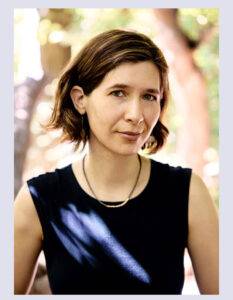
Where does the title Take What You Need come from?
The title comes from the biblical proverb: “If you find honey, eat just what you need lest you have too much and vomit it up.” I find it a proverb relevant to many aspects of the novel and of the choices we all quietly make, whether to take more than we need because we can. How does that excess impact the psyche, how we move through our days and relationships?
One in four people in the United States is estranged from a close relative, a painful subject at the center of Take What You Need. What led you to write about familial and political estrangements in this novel?
I had a painful argument with my stepbrother six years ago. At the time, he was involved in a creationist church that rejected the idea of evolution. We disagreed on so many issues that we stopped speaking and we didn’t get our children together during the entirety of the previous administration. I became acutely aware of how many friends had written off their close relatives, after similarly vehement disagreements.
It’s become an accepted part of life, the option to delete, block and mute people. Yet I couldn’t find any novels that addressed the long-term psychic cost of cutting off a sibling or parent over ideological divides. I wanted to read the inner experience of that kind of painful, relationship-shattering argument happening between family members all over the United States. As I have with each novel, I began writing the scenes I longed to read.
Leah’s character grew up like you in rural Pennsylvania. Her bilingual family has similarities to yours as well: her spouse hails from South America and her job involves working with words in multiple languages. Can you discuss your motivation for drawing from your own life when creating Leah’s character?
Leah’s life differs from mine in substantial ways, but for her sections I did draw on some experiences in rural Pennsylvania speaking Spanish with my family in public. Most people unaccustomed to hearing Spanish in that area ask questions out of curiosity in welcoming, respectful ways, but not always. Once a man fixing something on my parents’ porch yelled through the open window at me while I was giving lunch to my children at the kitchen table. He got irate and told me to stop speaking Spanish to them. It was quite shocking to have a stranger shout at me inside the house where I grew up, dictating what language I should speak with my children.
For Leah’s character, and for the sections about Elliott’s family, I also drew on conversations with Mexican American friends who live in the Allegheny Highlands, the experiences they described to me of speaking Spanish in public during the previous administration, and also before that, moments that have haunted them and their children.
Leah’s flashbacks of Jean’s volatile father are drawn from life as well. My grandfather dropped out of school at fourteen to support his family and felt stymied all his life. I’ve wanted to write for a long time about my memories of him sitting in the dark for hours. He’d get furious if anyone dared to turn on the lights.
What do you hope readers will take away from this novel?
I hope readers will start the novel with one expectation in mind and end up appreciating it most for another aspect entirely. This was not the novel I expected to write, and I hope the surprises in it will resonate with readers as well.
What are you excited to read in 2023?
The Mushrooms of West Virginia and the Central Appalachians by William Roody is a on my nightstand. My younger brother in Johnstown is a mushroom expert and has gotten me interested in the fungi particular to the Appalachian plateau. Nicholas F. Stump’s Remaking Appalachia is also on the nightstand. Stump’s take on the intersection of law, climate, and gender in Appalachia has been illuminating.
Two forthcoming 2023 titles I really admired are Johannes Lichtman’s new novel, Calling Ukraine, coming out in April. Lichtman wrote it before the Russian invasion of Ukraine and it’s a vivid, searching novel. Brandon Taylor’s The Late Americans, coming out in May, is a brilliant work of fiction, with stellar writing and a fascinating cast of characters.
What are you working on next?
I’ve started another novel set in the same invented town of Sevlick in western Pennsylvania. It took me ten books of poetry, fiction, and translation to finally invent a fictional world set where I grew up and where my family has lived for so long. I suspect I may write about Sevlick for many books, we’ll see.
For more about Idra Novey and Take What You Need, visit idranovey.com!


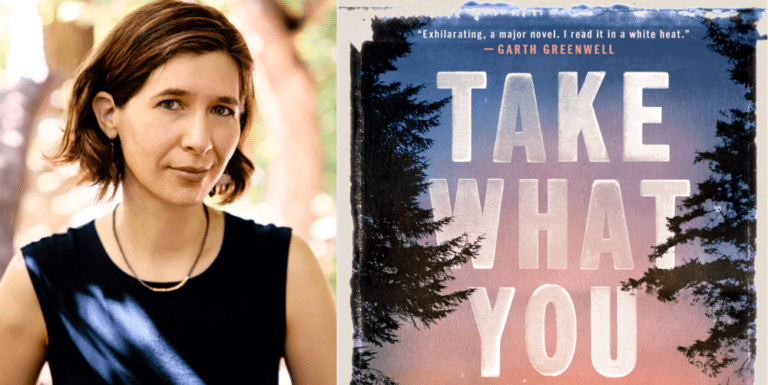
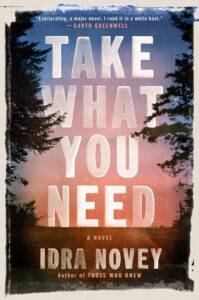



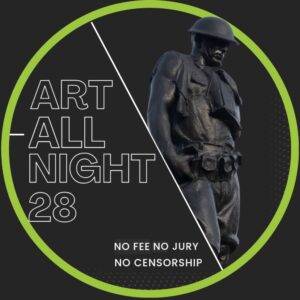












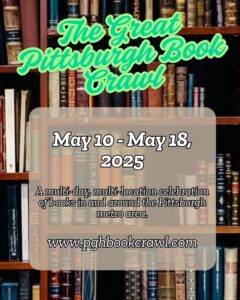
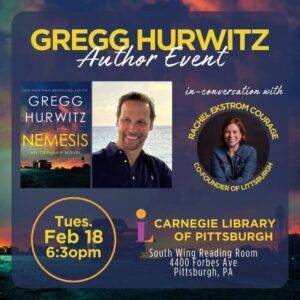





1 Comment
Pingback: Littburgh on KDKA to Help Launch the Talk Pittsburgh Book Club!